In a groundbreaking move, China Construction Bank (CCB) has partnered with Hong Kong-based fintech company Fusang to issue $3 billion worth of blockchain-based debt, marking the first digital security issued by a Chinese bank on blockchain technology.
This innovative initiative aims to lower the cost of issuing financial instruments while democratizing access to certificates of deposit (CDs), allowing retail investors to participate in an asset class traditionally reserved for professional investors and financial institutions.
Key Details of the Blockchain Bond
The bond issuance leverages blockchain technology to tokenize certificates of deposit, which will be sold at a minimum of $100 each and yield 0.75% interest at maturity.
How It Works:
-
Issuer:
- Certificates of deposit will be issued through CCB’s Labuan branch in Malaysia, which operates as a financial hub.
-
Tenor and Yield:
- The bond has a tenor of three months and offers a 0.75% yield, significantly higher than the 0.25% annual interest rate offered by traditional banks.
-
Accessibility:
- Tokenized CDs enable retail investors to participate with smaller amounts, breaking down barriers to entry.
Blockchain’s Role in Financial Instruments
Blockchain technology is revolutionizing traditional financial markets by reducing costs and eliminating intermediaries.
Advantages of Blockchain Bonds:
- Lower Costs: Fewer intermediaries result in reduced issuance costs.
- Accessibility: Tokenization allows retail investors to purchase smaller denominations.
- Transparency: Blockchain ensures secure and transparent transactions.
Fusang Exchange: A New Era of Trading
The digital certificates will be traded on the Fusang Exchange, a licensed digital exchange regulated by Labuan’s financial authority.
Unique Trading Features:
-
Bitcoin Integration:
- Investors can trade the certificates using bitcoin, marking a significant step toward integrating cryptocurrencies with traditional finance.
-
US Dollar Trading:
- Trading can also be conducted in USD, catering to a broader range of investors.
-
Future Plans:
- Fusang plans to collaborate with CCB on bond issuances in other currencies, including the Chinese yuan, if this initiative succeeds.
Democratizing Access to Certificates of Deposit
Traditionally, certificates of deposit in China are sold at high denominations and cater primarily to professional investors or banks. Tokenizing these instruments on blockchain allows:
- Retail Participation: Investors can buy CDs for as little as $100, making them more accessible.
- Interbank Funding: Smaller banks can use these digital certificates for funding, supporting financial inclusion.
Potential Impact on Financial Markets
1. Pioneering Blockchain Bonds
CCB’s move positions it as a leader in integrating blockchain technology into conventional finance, setting a precedent for other financial institutions.
2. Boosting Cryptocurrency Adoption
Allowing bitcoin as a trading currency for these bonds bridges the gap between traditional finance and digital assets, paving the way for greater crypto adoption.
3. Expanding Market Opportunities
By enabling retail participation, this initiative could significantly expand the market for bonds and certificates of deposit.
Henry Chong’s Vision for Fusang
Henry Chong, CEO of Fusang, expressed optimism about the partnership with CCB, stating:
“If this transaction is a hit with investors, Fusang hopes to work with the state-owned bank on issuance in other currencies, including yuan.”
This collaboration demonstrates Fusang’s commitment to enhancing accessibility and innovation in financial markets.
Conclusion
China Construction Bank’s blockchain bond launch with Fusang represents a significant milestone in the integration of blockchain and traditional finance. By tokenizing certificates of deposit and allowing retail investors to trade using bitcoin, this initiative not only lowers barriers to entry but also bridges the gap between cryptocurrencies and conventional financial instruments.
As blockchain technology continues to reshape global financial markets, initiatives like this highlight the potential for innovation, accessibility, and inclusion in the financial sector.
To learn more about blockchain’s impact on finance, explore our article on blockchain adoption in banking.
Disclaimer: The information provided is not trading advice, Bitcoinworld.co.in holds no liability for any investments made based on the information provided on this page. We strongly recommend independent research and/or consultation with a qualified professional before making any investment decisions.




